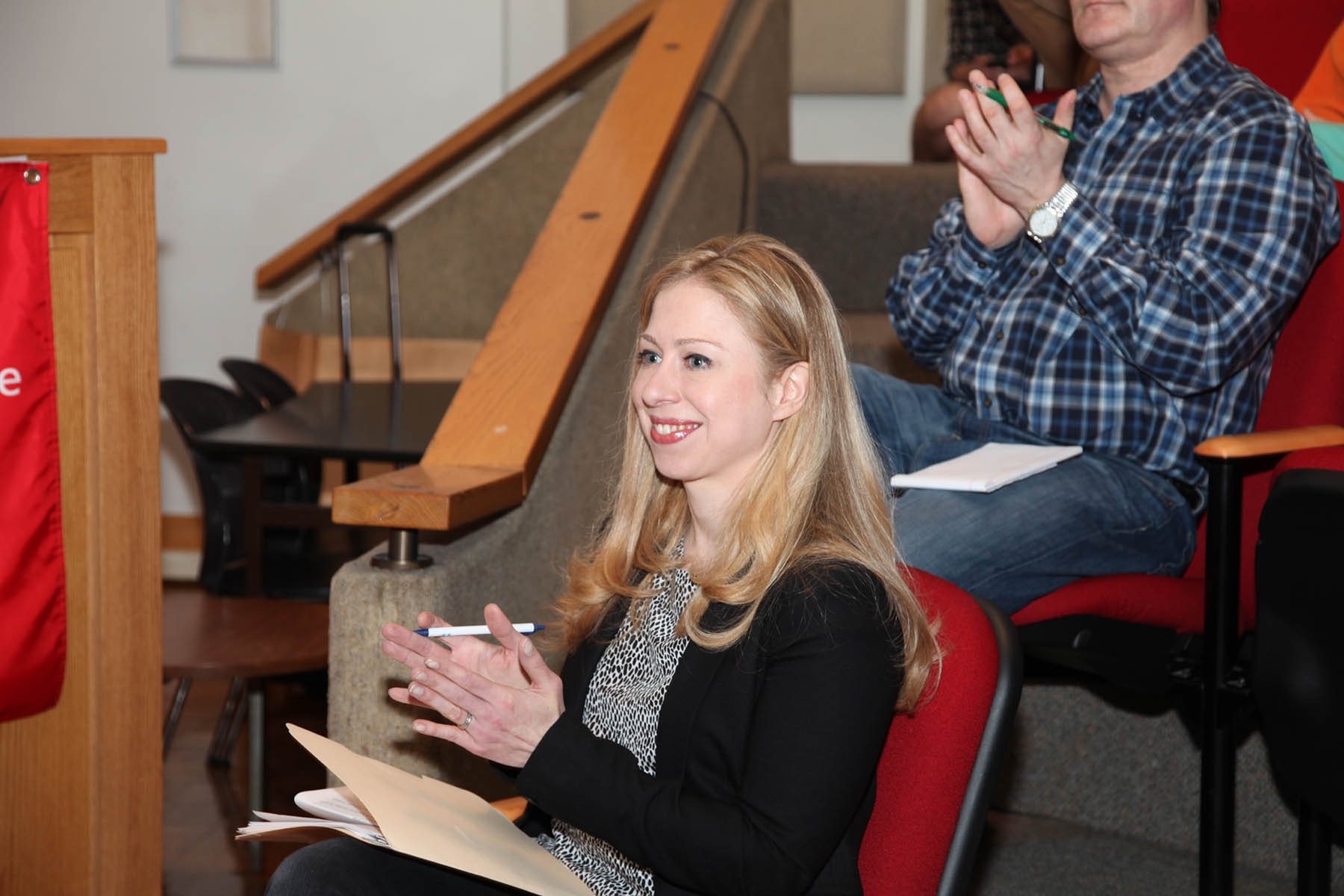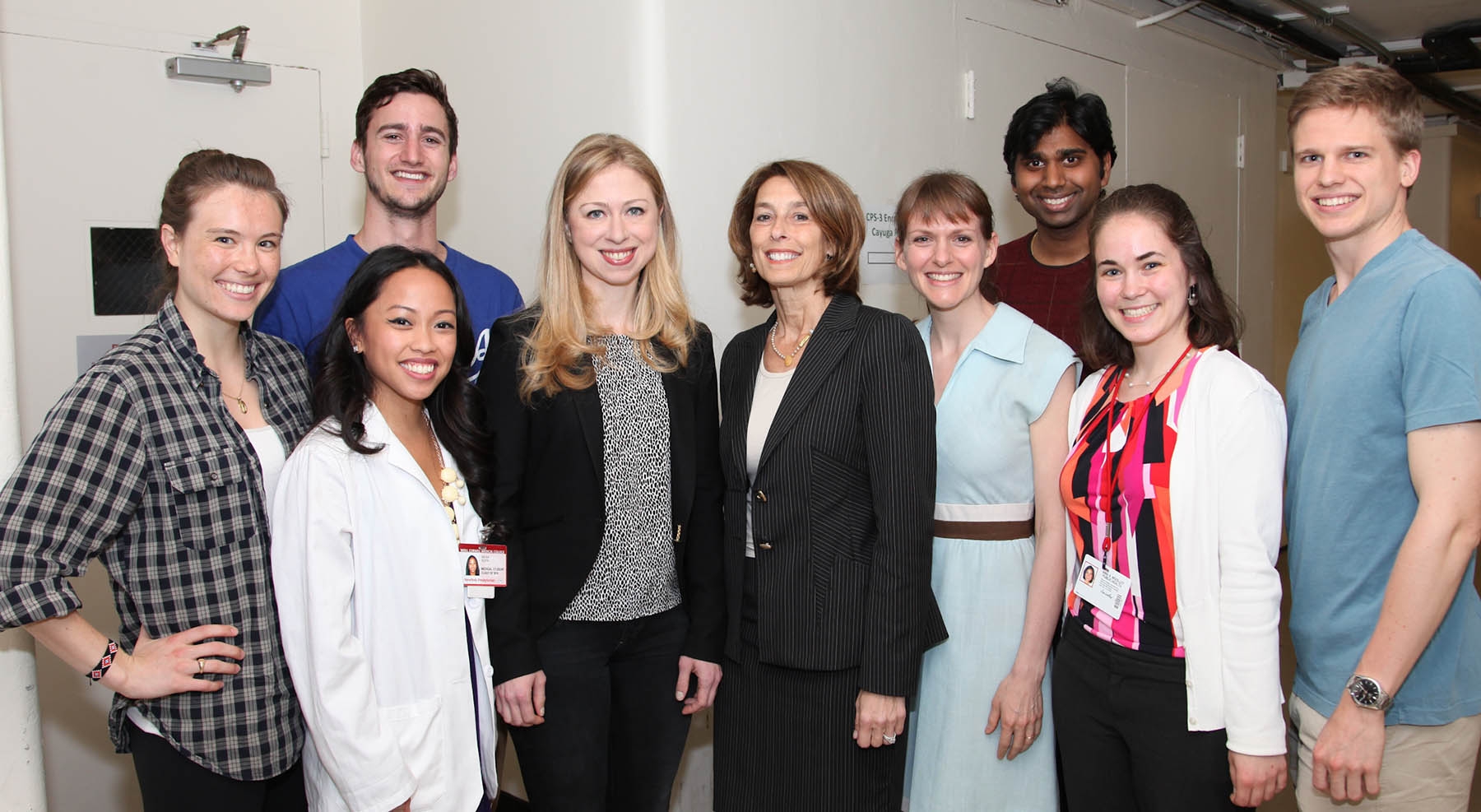A champion for affordable and quality health care around the globe, Chelsea Clinton gave a Global Health Grand Rounds talk at Weill Cornell Medical College May 22 to share the achievements of the Clinton Health Access Initiative (CHAI). Clinton is a CHAI board member and a member of Weill Cornell's Board of Overseers.
Since its inception as the Clinton HIV/AIDS Initiative in 2002 and later renamed the Clinton Health Access Initiative, the nonprofit foundation has transformed the paradigm for care in countries around the world by negotiating the price of life-saving diagnostics and medicines, expanding access to innovative technologies, working to change the current circumstances of inaccessible health care and establishing a sustainable health care model for local governments to maintain.

Weill Cornell Overseer Chelsea Clinton speaks at Weill Cornell Global Health Grand Rounds May 22. Photo credit: Chloe Apple Seldman/ Ira Fox
"The only way any of this will be systemic is if those of us who think we are pretty good at disrupting the status quo can actually have that work disseminated and sustained by those who are really good at implementing and really good at procuring," said Clinton, who spoke on "Changing the Model: The Work of the Clinton Health Access Initiative."
"The monthly Global Health Grand Rounds lecture series is designed to showcase renowned global health leaders and foster discussion of pressing global health challenges," said Dr. Madelon Finkel, director of the Office of Global Health Education and professor of clinical public health at Weill Cornell. "The Clinton Foundation is a prominent force in the field of global health and the Global Health Grand Rounds committee felt it was important to learn about what the Foundation is doing, and where."
Clinton's talk, delivered to a standing-room only crowd in Uris Auditorium, highlighted the work CHAI is doing in 30 countries around the world, and strove to galvanize the next generation of doctors and health professionals to get involved.
"The Clinton Health Access Initiative's efforts to improve access to essential drugs have been pivotal in 21st century global health and animates precisely how scientific innovation and political will can change lives," said Dr. Sandeep Kishore, an M.D.-Ph.D. student at Weill Cornell and a founder and steering committee member of Weill Cornell's Global Health Curriculum group, which is developing curriculum for a new global health specialty at the medical college. "The fact that Chelsea Clinton, a millennial part of the next generation, is on the Board of Overseers of our institution makes this lecture even more critical; her comments on the future help provide a roadmap on where great universities and motivated student/faculty collectives can strike."
That path to advance global health was forged by her father, President Bill Clinton, who, reflecting on his presidency after his second term was completed, established the Clinton HIV/AIDS Initiative in 2002 to address the HIV/AIDS crisis in the developing world.
"One of his great regrets of his presidency is that he did not do more to combat HIV/AIDS, both domestically and globally," Clinton said. "When he was thinking about how — the question of 'How' —he wanted to leverage both his still inexhaustible energies and his convening authority to make a difference."
At the time, it cost $350 for antiretroviral drugs to control the disease — an exorbitant price that stymied care in many places in the world that didn't have the leveraging power to demand more.
"There's nothing like something that seems impossible to wet my father's appetite," she said. "And, despite the fact that he was told this was an insurmountable burden, particularly given that the global fund was nascent and it was not clear whether or not there would be historically large resources galvanized in the fight against AIDS and, given how there was, I think, still great skepticism in much of the west about the capacity or integrity of governments in the developing world to actually try to tackle this challenge, he knew he had to at least try. We have an adage in our family that it is always better to get caught trying."
It took more than a year, but President Clinton was able to convince pharmaceutical companies and generic manufacturers to drop the price of antiretroviral drugs 50 percent to $175. Now the cost is less than $70 in much of the world.
After seeing the impact its work had on the world and being "obsessed about how we always can be doing more to reach more people," Clinton said, the initiative expanded to improve care in new fields. In 2007, the initiative began work to increase access to high-quality treatment for malaria and diarrhea, accelerate the rollout of new vaccines — including the pneumococcal and rotavirus vaccines — and lower infant mortality.
Most recently, the initiative, which changed its name to the Clinton Health Access Initiative in 2010, began working in Rwanda to establish an effective pipeline that will generate doctors and other health care professionals who can continue the initiative's mission of delivering quality and affordable care.
"I'm grateful that CHAI has been able to break so many past biases and so many things that now seem obvious, like antiretrovirals and the pneumococcal vaccine, can hopefully be taken for granted at some point," Clinton said, "so that we can focus on building central capacities that will be part of our future."

